Dr. Mardy's Quotes of the Week ("Living in the Present Moment")
June 22 - 28, 2025 | THIS WEEK'S THEME: “Living in the Present Moment"
Opening Line of the Week
The juxtaposition of antithetical elements is a staple in the world of Great Opening Lines—and few things differ more than the two ideas presented here. I don’t know about you, but I want to learn more.
For more than 2,000 memorable opening lines from every genre of world literature, go to www.GreatOpeningLines.com.
This Week’s Puzzler
On June 28, 1926, this man was born into a Russian-Jewish family in Brooklyn (he celebrates his 99th birthday this week). A small and skinny kid who was trying to make a way for himself in the city’s public school system, he was the object of constant teasing and bullying. Decades later, he said it was a perfect training ground for developing humor as a survival tool.
After graduating from high school, he attended Brooklyn College for a year before being drafted into the army in 1944 (he eventually saw action in The Battle of the Bulge). After the war, he began working at resorts in the “Borscht Belt,” starting out as a pianist and drummer, and eventually as a stand-up comic. His first big break occurred in 1950 when his friend Sid Caesar hired him to write jokes for one of history’s most influential TV comedy shows, “Your Show of Shows.”
After earning a place in comedy history with his “2000 Year Old Man” routine, he made cinematic history with such classic films as “Blazing Saddles,” “Young Frankenstein,” and “The Producers.” In 2000, he adapted “The Producers” to the stage, turning it into a huge hit on Broadway. He is one of a select number of people—21 as of this writing—to win an Emmy, Grammy, Oscar, and Tony award (collectively referred to as EGOT in the industry).
Over the years, this week’s Mystery Man has offered countless observations combining both wit and wisdom. One of my personal favorites is:
Who is this person? (Answer below)
How Good Are You at Living in the Present Moment?
The quotation in this week’s Puzzler is a brilliant tweak of one of philosophy’s most famous maxims. Great comedians have always been able to use humor to reframe serious ideas—and in this week’s featured observation, our Mystery Man cleverly reminds us that the time-honored principle of knowing who we are is actually far less important than being able to experience life fully and completely in what is commonly called the present moment.
We hear the injunction to live in the present moment all the time, but to fully appreciate what it means, it helps to see someone not doing it. Imagine this scene. A man in a summer suit is walking through a bustling city park on a bright, sunny day. Instead of having a pleasant smile or peaceful expression on his face, he appears deep in thought, perhaps even troubled.
Like all parks, this one is a sensory paradise. There are birds—everywhere—making sounds that range from the sonorous to the discordant. The place is filled with dogs as well, some napping, others frolicking with other canines, and still others eagerly racing to retrieve balls thrown by their owners. All over the park, there are squirrels engaged in what looks like a game of catch-me-if-you-can. There are lovers holding hands as they gaze into each other’s eyes. There are children impressing elders with their hula-hoop skills or sitting motionless while artists meticulously paint their faces. There are kites struggling to stay afloat when the wind dies down, a swarm of bees interrupting a family picnicking on a blanket, and an intricate spiderweb glistening with moisture after being ambushed by boys with water pistols. You hear the hard whack of a baseball being struck and the swish of a basketball hitting nothing but net, and can’t help but compare those sounds to the silent flight of a Frisbee sailing just over the reach of a distant child. You feel a cool breeze coming off the pond and a slight drop in temperature as a dark cloud temporarily blocks the sun’s rays.
The man in the park, however, seems oblivious. He’s clearly paying attention to something, but it is to his inner world, and not to the extravaganza around him. Instead of appreciating all that is happening in the park, his attention is likely fixed—or more precisely, fixated—on his past, his future, or both. As a result, he has completely lost the ability to experience “the here and now” of his life.
Life in the Past Tense. When people are preoccupied by thoughts about the past, they’re said to be ruminating, an apt word borrowed from the world of animal digestion—specifically, from cows and other ruminants who chew, swallow, and then regurgitate their food to chew it again. In the theater of the mind, there’s an analogous process that involves the repetitive replaying of past blunders, mistakes, resentments, regrets, grievances, bad breaks, missed opportunities, and old wounds.
Just as cows recycle their cuds, human ruminators recycle the same thoughts over and over again without any sense of progress or resolution. Not to be confused with reflective thinking or introspection, rumination is a form of circular thinking that keeps people trapped in the past—like spinning your wheels when your car is stuck in the mud—and it stands as one of the most formidable barriers to living fully in the present moment.
Life in the Future Tense. When people are preoccupied with thoughts about the future, they’re often described as “stressed out,” a modern, colloquial expression that echoes the older and more clinical term anxious. Anxiety is a word long associated with mental distress, and I only recently learned that the word is derived from the Latin angere, meaning “to choke, squeeze, or constrict.” The etymology perfectly captures the actual experience of those in the vice-grip of anxiety.
Anxiety in its many forms—including worry, nervousness, dread, and catastrophic thinking—is a form of fear, and typically centered on the potential loss of something deeply important to us. It should not be mistaken for mere pessimism or everyday negative thinking. It’s more like sprinting on a mental treadmill, fixated on worst-case scenarios that exist only in our imagination. There’s nothing proactive or prophylactic about this kind of thinking. Instead of preparing us to meet future challenges, it’s a mind-numbing, energy-sapping exercise that sucks the joy out of life and robs us of the ability to be fully present.
In his classic 1997 work on The Power of Now, Eckhart Tolle nicely summed up everything I’ve written above:
There have been many times in my life—especially in my earlier life—when I could have easily been the man in the park. And in each and every one of those times, I ignored a piece of wisdom that the great American theologian Frederick Buechner expressed in a single sentence:
He preceded the thought by writing:
“The point is to see it for what it is, because it will be gone before you know it. If you waste it, it is your life that you’re wasting. If you look the other way, it may be the moment you’ve been waiting for always that you’re missing. All other days have either disappeared into darkness and oblivion or not yet emerged from it.”
Happily, I’m now only rarely in those dark places because I’ve tried to heed some ancient advice. More than 2,500 years ago, The Buddha taught that being aware of the present moment was not merely a way to calm the mind, it was an effective way to liberate oneself from suffering. In the Western tradition, Marcus Aurelius echoed this idea in his Meditations (2nd c. A.D.), where he wrote:
“Every man’s life lies within the present; for the past is spent and done with, and the future is uncertain.”
And all of this ancient wisdom was ultimately absorbed into the heart and soul of modern psychology:
While I heartily believe in the concept of living in the present moment, I occasionally fall far short of the goal by either getting hopelessly stuck in the past or all worked up about something that may or may not happen in the future. And whenever I find myself succumbing to these two problems, I find it helpful to go to my collection of quotations on the theme. Generally, a moment’s reading helps me get back on the right track.
Over the years, I’ve developed a great admiration for the many live-in-the-moment authors I’ve encountered in my studies. But let me bring my remarks to a close this week by mentioning that I’ve developed one important misgiving about where some of them have taken their thoughts.
A Good Idea Carried Too Far
While the injunction to live in the present moment has been around for centuries, some modern proponents of the idea seem to be recommending that we live ONLY in the present moment, disregarding the past because it’s over, and ignoring the future because it has not yet arrived. It’s a simple and appealing idea, but a huge mistake, in my opinion, and can only result in scenarios like the one I recently imagined below:
There’s always a danger in turning a powerful insight into a mindless slogan, and when “living in the present moment” is taken to its extreme, it can become a rationalization for disengagement, irresponsibility, and self-indulgence. The idea of living only in the present results in people who feel no connection to world history, who’ve learned nothing from their own personal histories, who have no interest in creating a better future for themselves or others, and who have no commitment to anything beyond self-gratification. This is not personal freedom, but a cowardly refusal to, in Teddy Roosevelt’s words, step into the arena. It is turning one’s back on life.
To function effectively, we must incorporate the past, present, and future into our lives. The past, when approached with honesty and humility, can teach us. The future, when approached with imagination and intention, can inspire us. And the present moment, viewed properly, is not a stand-alone destination, but the all-important bridge that completes the temporal arrangement. We need all three in our lives if we are to fully grasp the meaning of Søren Kierkegaard’s legendary observation:
“Life can only be understood backwards; but it must be lived forwards.”
This week, take a few moments to think about how well you’ve been able to live in the present moment. Before you do, though, let your thinking be stimulated by this week’s compilation of observations on the subject:
I still lived in the future—a habit which is the death of happiness. — Quentin Crisp
The older one gets the more one feels that the present moment must be enjoyed; it is a precious gift, comparable to a state of grace. — Marie Curie
There is only one moment in which you can experience anything, and that is now, yet a great deal of time is thrown away by dwelling on past or future experiences. — Wayne W. Dyer
No mind is much employed upon the present: recollection and anticipation fill up almost all our moments. — Samuel Johnson
The past is dead, the future is imaginary; happiness can only be in the Eternal Now Moment. — Ken Kesey
I got the blues thinking of the future, so I left off and made some marmalade. It’s amazing how it cheers one up to shred oranges or scrub the floor. — D. H. Lawrence
Hold every moment sacred. Give each clarity and meaning, each the weight of thine awareness, each its true and due fulfillment. — Thomas Mann
The here and now is all we have, and if we play it right it’s all we’ll need. — Ann Richards
I’m in the Now a lot more now/And here’s what’s even greater/I never ever can run out/There’s always more Now later. — Greg Tamblyn
Realize deeply that the present moment is all you ever have. Make the Now the primary focus of your life. — Eckhart Tolle
Cartoon of the Week:
Answer to This Week’s Puzzler:
Mel Brooks
Dr. Mardy’s Observation of the Week:
Thanks for joining me again this week. See you next Sunday morning, when the theme will be “GENEROSITY”
Mardy Grothe
Websites: www.drmardy.com and www.GreatOpeningLines.com
Regarding My Lifelong Love of Quotations: A Personal Note

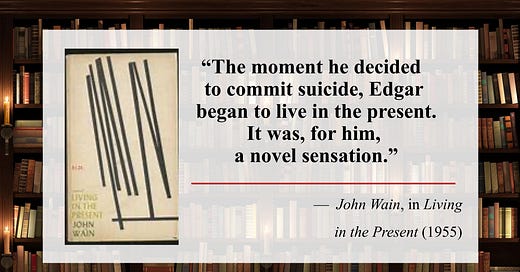



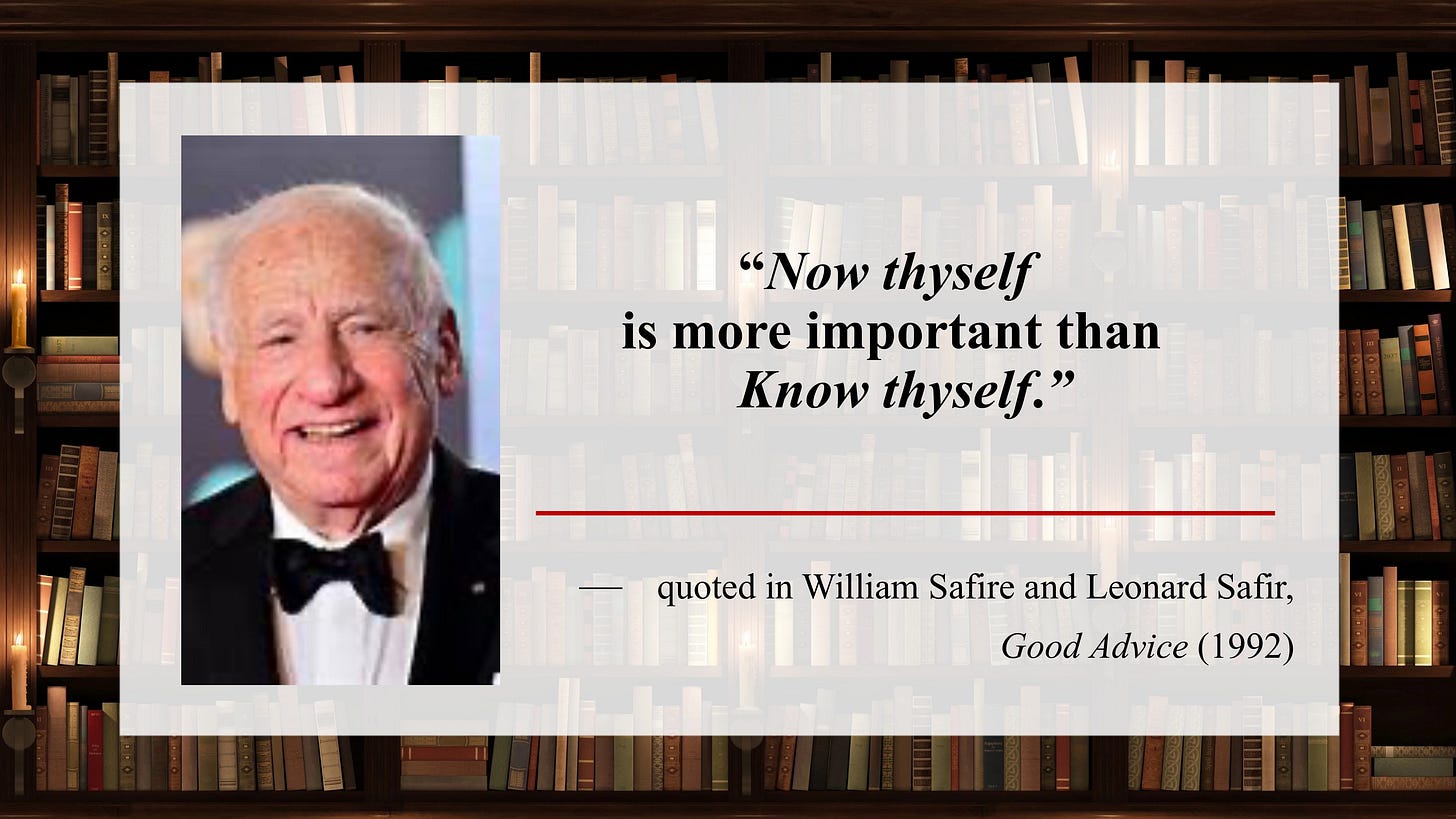
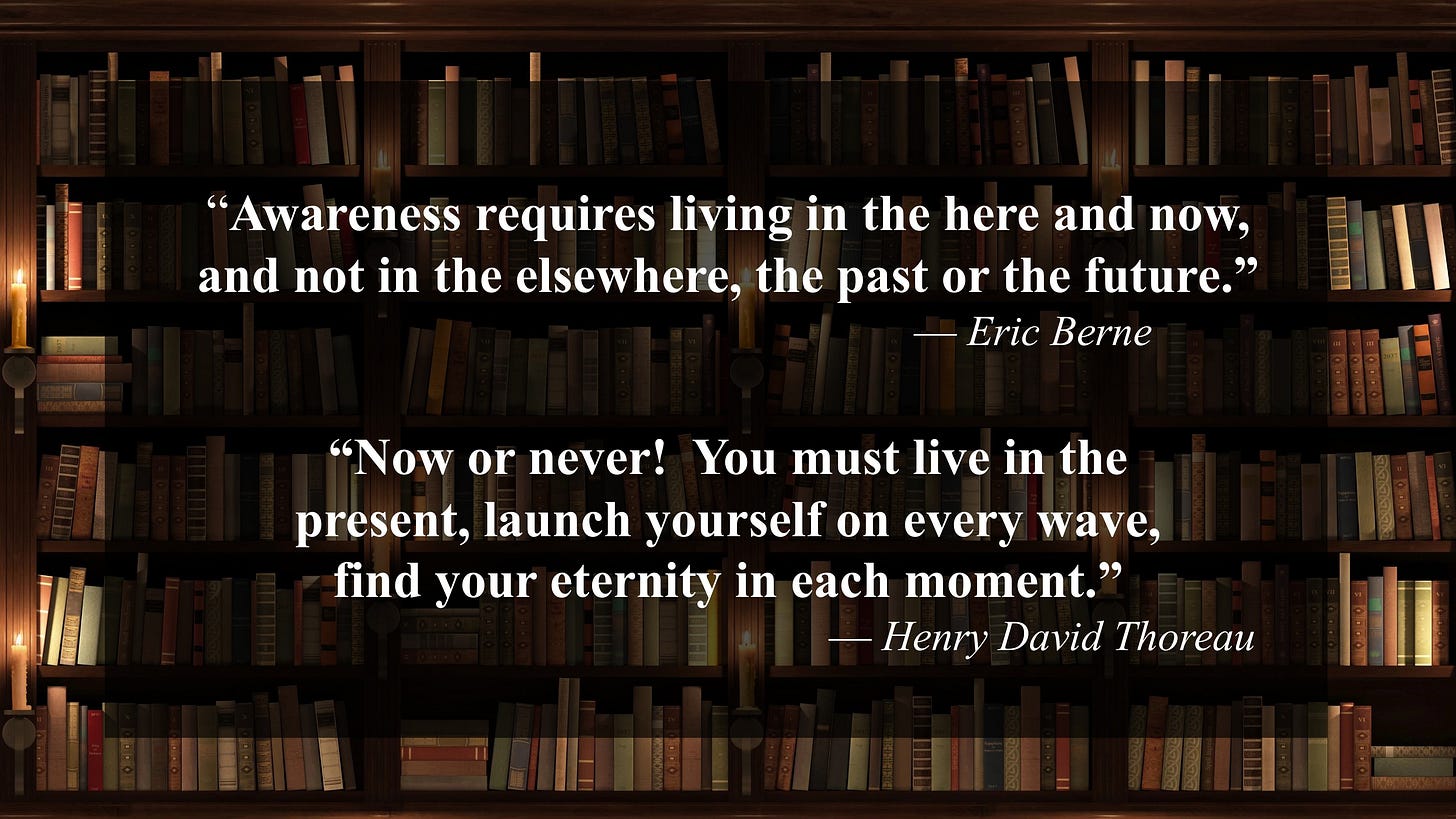

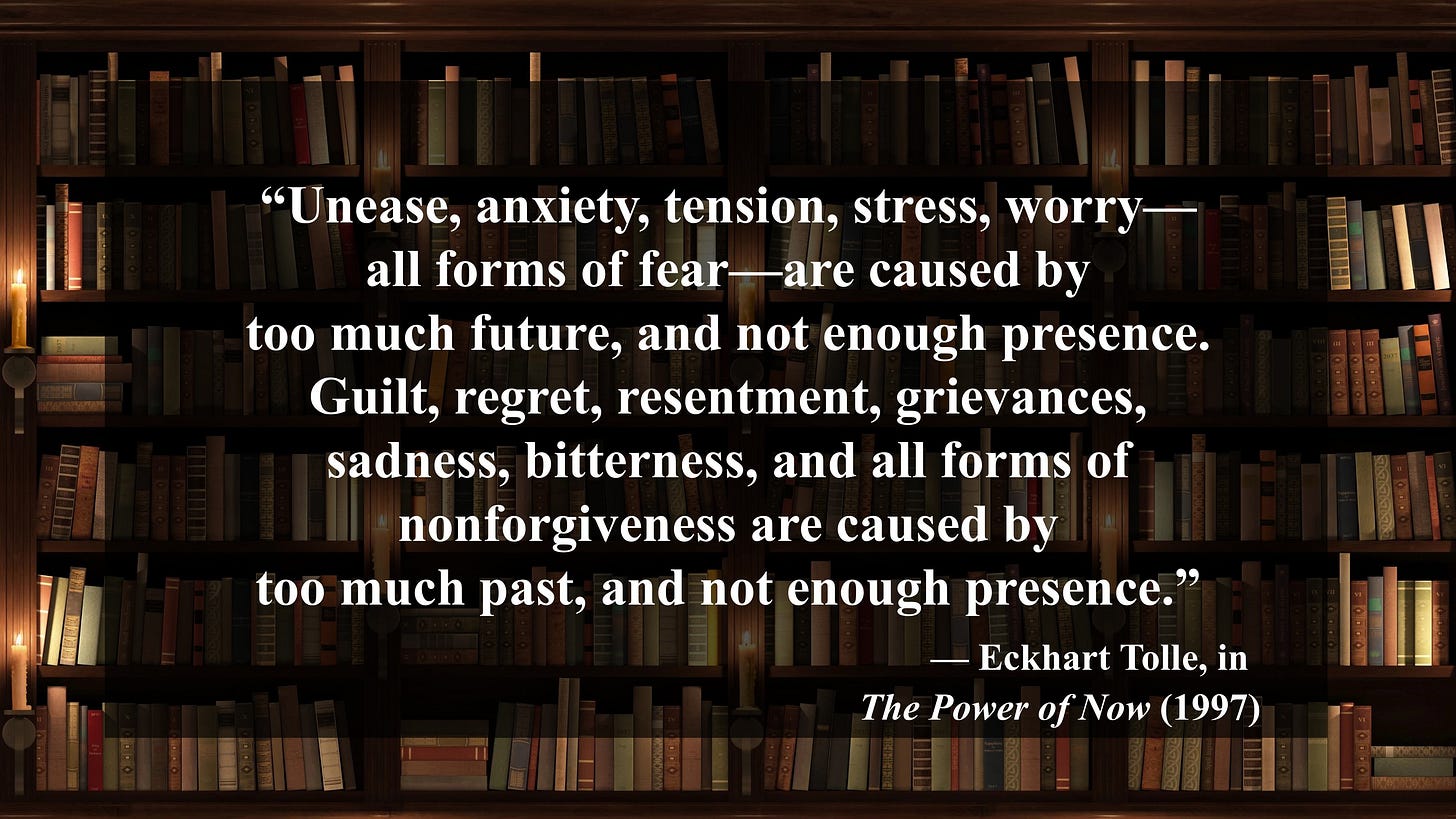

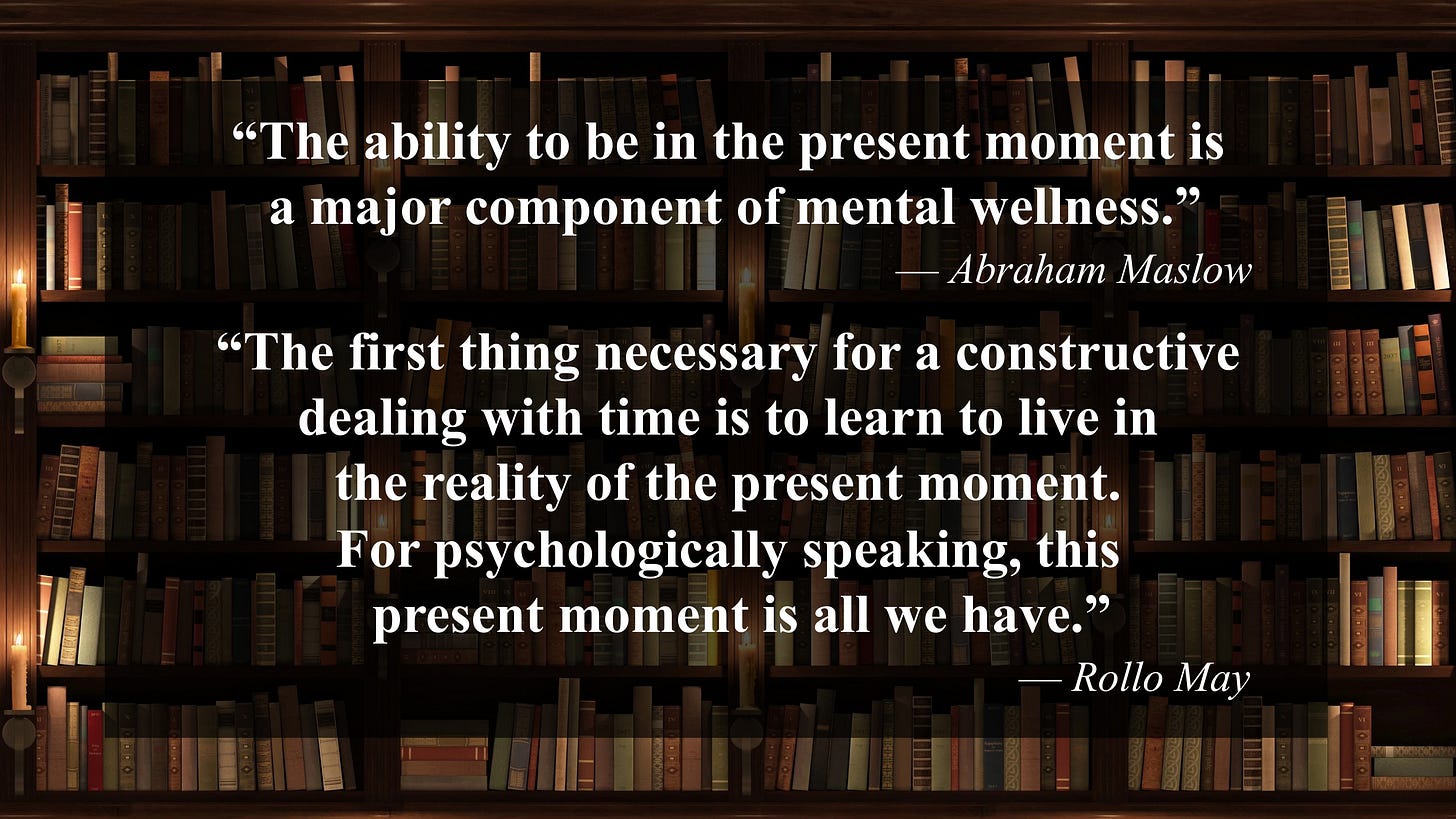
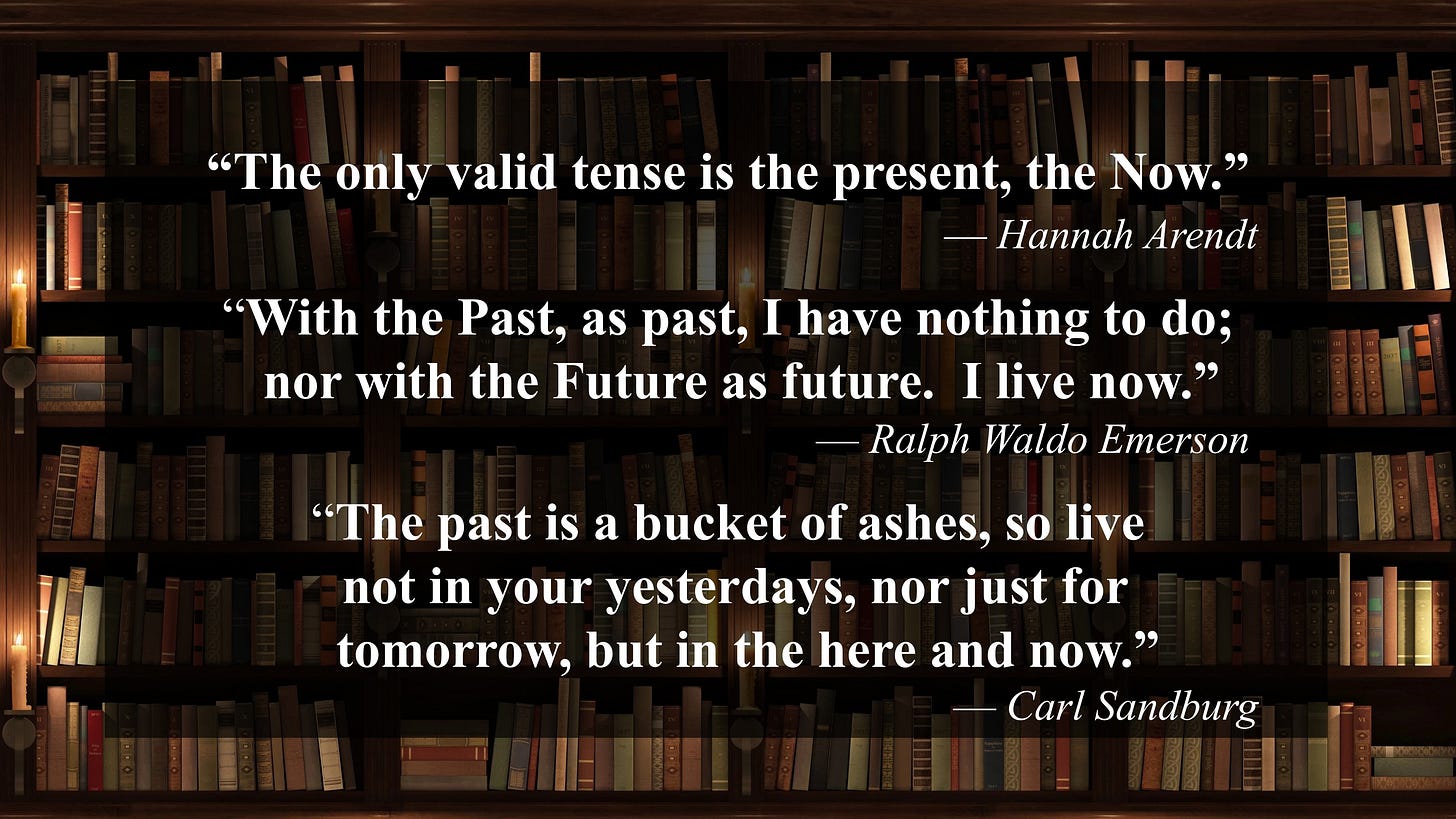
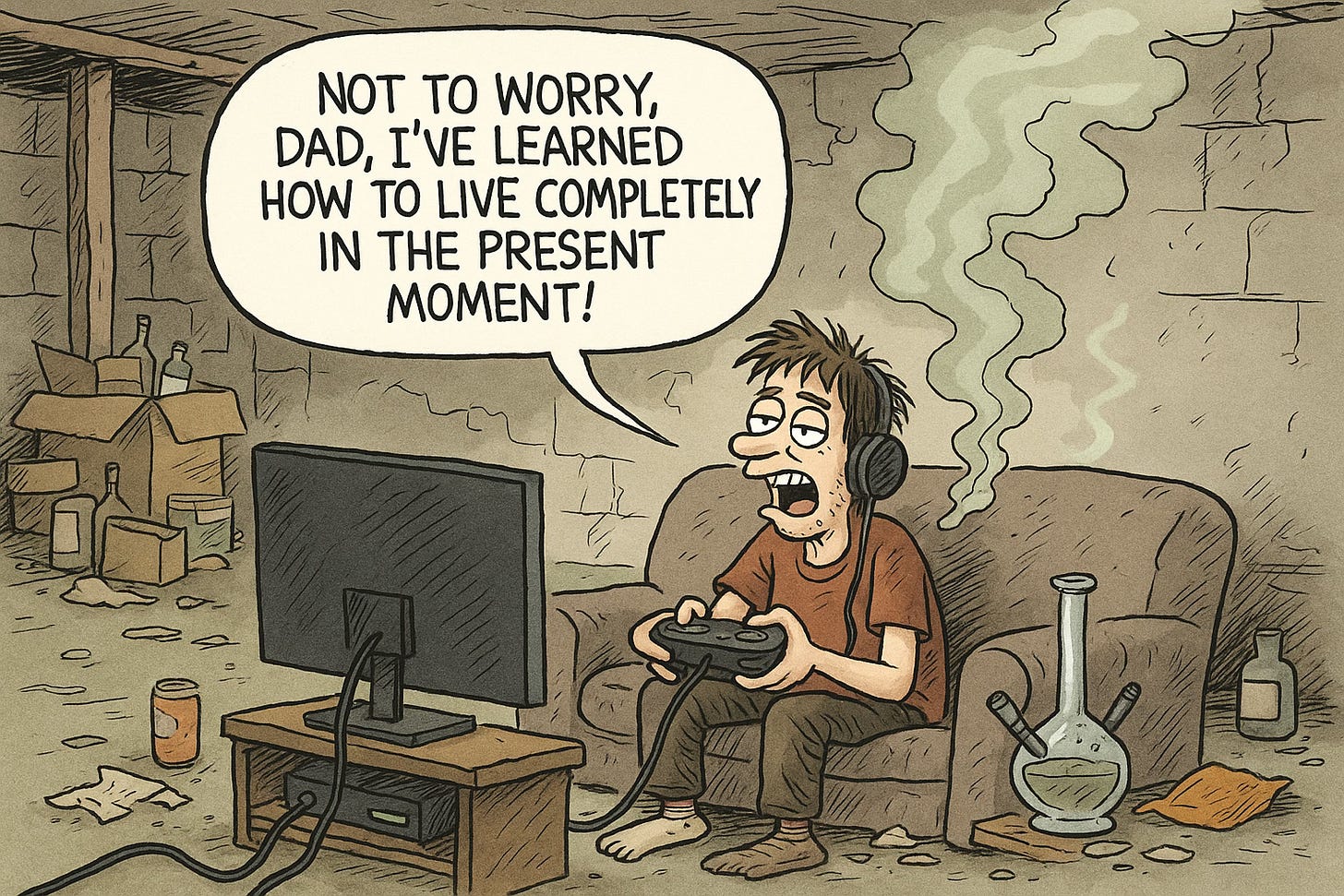
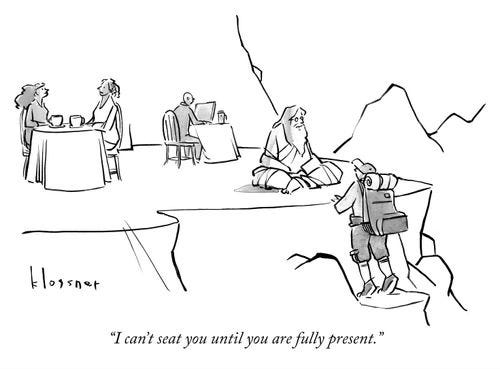
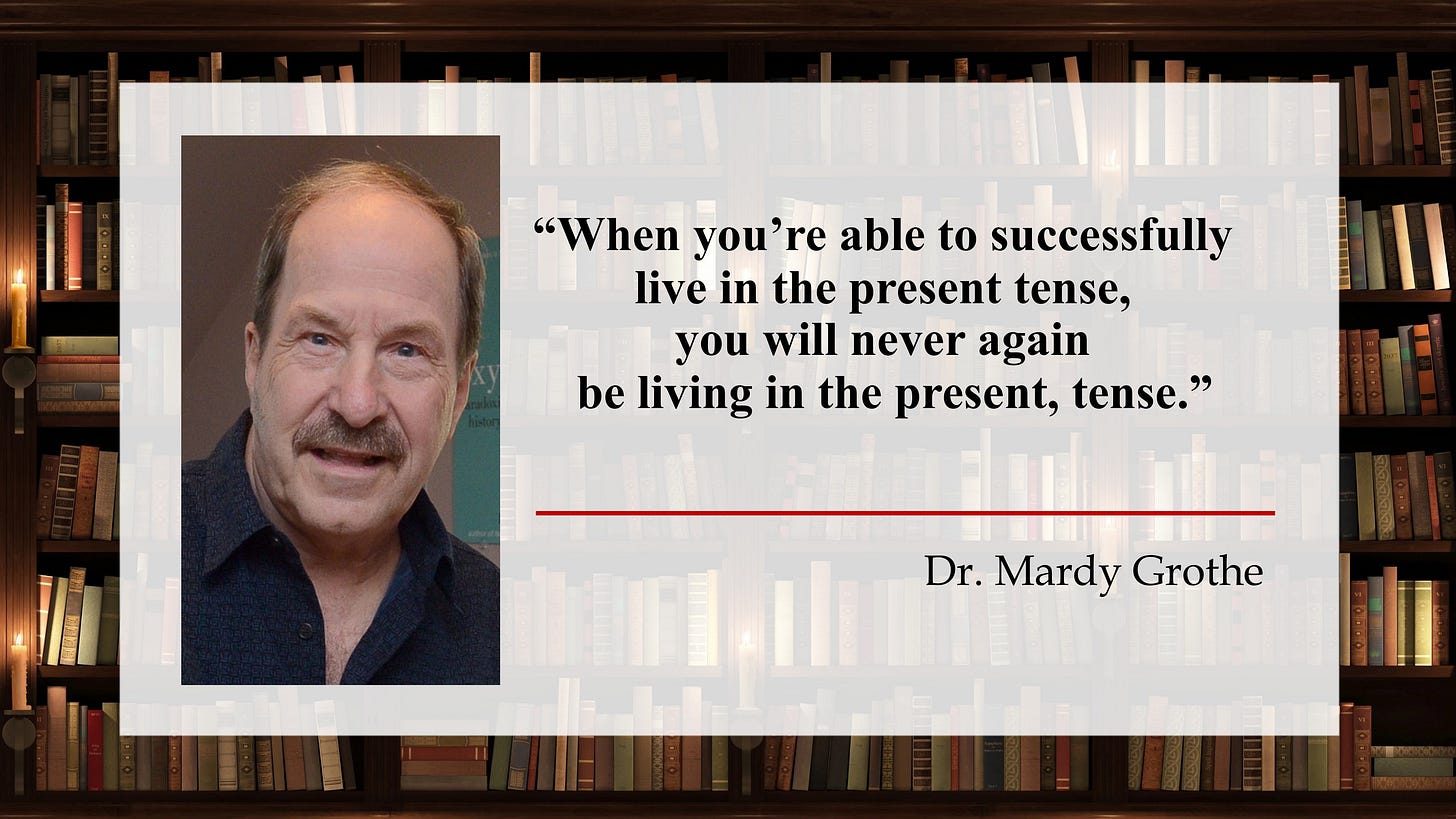
It's a pleasure to read this newsletter this week. Not only is it filled with the wisdom gleaned from millennia of quotations but it is leavened with the wisdom gained by decades of psychology study and practice. And we get another dose of this tantalizing, blended elixir every week.
Good morning....just 7AM here....woke up to the worst news... I'm taking your advice and trying to live in this moment, not yesterday or even 5 minutes from now. Trying NOT to think. Mardy, it's uncanny the timing of your newsletter topics.... Thanks for reminding me to 'be here now'... Stay safe everyone. PS Mel Brooks is one of my favorite human beings...thank you.